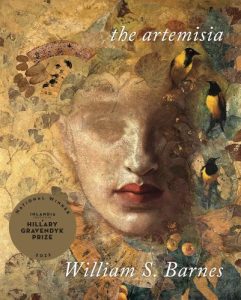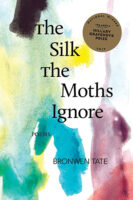
Review by Jami Macarty
In the artemisia, national winner of the 2022 Hillary Gravendyk Prize, poet and botanist William S. Barnes presents ecstatic love poems in the tradition of Sappho and Rumi. Like his predecessors, Barnes’s poems “sit in the light between” elegy and ode, expressing passionate love and desire. They honor the emotional experiences and “wild abundance” of mortal life, drawing “out from within” an upward reaching “sweetest song.”
In addition to lyric poetry, the domains of the artemisia are mythic, folkloric, and botanical. Artemisia refers to a hardy shrub known for its digestive benefits. In Greek mythology, Artemis is Apollo’s twin sister. She is the goddess of the moon and nature.
Barnes’s ode pays tribute to plants’ “brilliant canopies of leaves” and “chromatic range of green.” His elegy memorializes a “soulfriend.” Excerpts from her letters are interwoven with his lines to create a living dialogue. In these ways, the poems undulate between the “persistence” and “decay” of life: “I’m cut in two and all the leaves are coming out.”
Regardless of what “is nurtured,” whether “laughing or leaving,” every poem a “rising to meet” and “invite you in.” Barnes’s poems welcome us, hold our hands, and teach us. In “the veils (viola adunca),” the poet offers a plantsman’s “truth” as he describes the five-petaled dog violet:
“difficult to press. it is not possible to see the whole
without cutting. and this would make it something else.
the listener must infer what cannot be said.”
While acknowledging the challenge of conveying the deepest human emotions and truths in language, Barnes makes space for the mystery in words and expression, naming “themselves again” for us. The “leaning into” poems of William S. Barnes’s second collection are “evanescent” in their language and in their representation of life’s “pathway” as it “bends into the hills, across the contour, rising.”
the artemisia by William S. Barnes. Inlandia Institute, April 2024.

